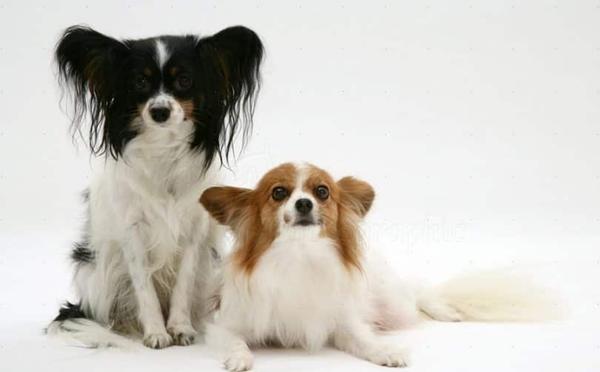Papillon
also known as Continental Toy Spaniel, Squirrel Dog, Butterfly Dog, Phalène (Drop Ear Type), Epagneul Nain, Phalène, Epagneul Nain Continental

 History
History
The Papillon, also known as the "butterfly dog" due to its distinctive butterfly-like ears, is a small and lively breed with a long and fascinating history.
The breed is believed to have originated in the Mediterranean region, with some historians tracing its origins back to ancient Greece and Rome. The name "Papillon" is French for "butterfly," and it is thought that the breed was named for its unique ears, which resemble butterfly wings.
The Papillon was first officially recognized by the Kennel Club in England in 1885, and by the American Kennel Club (AKC) in 1915. The breed is also recognized by many other kennel clubs and organizations around the world, including the Canadian Kennel Club (CKC) and the Australian National Kennel Council (ANKC).
The Papillon was developed as a companion dog, and is known for its playful and affectionate nature. They are small in size, typically weighing between 4-9 pounds, and have a long and silky coat that comes in a variety of colors, including white, black, and brown. They are also known for their sharp intelligence and trainability, making them a popular choice for agility and obedience competitions.
Historically, the Papillon was a favorite of European nobility, including French King Louis XIV, who owned several Papillons, and Queen Victoria of England, who also kept Papillons as pets. The breed was also popular with Catherine the Great of Russia and Mary, Queen of Scots. The breed also played an important role in the development of other toy breeds, including the Cavalier King Charles Spaniel, the Japanese Chin, and the Maltese.
Breed Information
Is Papillon a purebred?
Purebred
What were Papillons originally used for?
lap dog
How Long Do Papillons Live? What is average life expectancy for a Papillon? How long can Papillons live?
13-16 years
The average Papillon lifespan is somewhere between 13-16 years, provided they aren't beset by any exceptional health issues or injuries.
Papillon Height & Weight
How big is a full grown Papillon?

| Height | ||||
|---|---|---|---|---|
| Average | 6 months | 12 months | 18 months | |
| Male | 8-11 inches (20.3 - 27.9 cm) | 2.5 inches (6.4 cm) | 5.0 inches (12.7 cm) | 8.0 inches (20.3 cm) |
| Female | 8-11 inches (20.3 - 27.9 cm) | 2.5 inches (6.4 cm) | 5.0 inches (12.7 cm) | 8.0 inches (20.3 cm) |
| Weight | ||||
|---|---|---|---|---|
| Average | 6 months | 12 months | 18 months | |
| Male | 8-10 pounds (4 - 5 kg) | 2.5 pounds (1 kg) | 4.5 pounds (2 kg) | 7.0 pounds (3 kg) |
| Female | 7-9 pounds (3 - 4 kg) | 1.5 pounds (1 kg) | 3.5 pounds (2 kg) | 6.0 pounds (3 kg) |
Do Papillons get fat easily?
![]()
![]()
![]()
![]()
![]()
The Papillon is a breed that has an average risk of becoming obese. Daily walks and a balanced diet of quality dry dog food can help maintain a healthy weight. An active lifestyle and monitoring weight regularly is recommended.
Are Papillons Hypoallergenic?
No
Unfortunately, the Papillon is not hypoallergenic, making it not a good choice for a dog lover who suffers from pet allergies.
What is a Papillon personality? What are Papillon dogs best known for?
Alert
Friendly
Energetic
Happy
Intelligent
Are Papillons heavy shedders? How Much Does a Papillon Shed?
![]()
![]()
![]()
![]()
![]()
Papillon will shed a negligible amount of hair. Some owners say that they do not shed, but that is not true. But the amount of shedding can be rather light than other dog breeds. If you do not want to deal with the hairs flying around in your home, then this breed is a perfect choice for you.
What is the watchdog ability of a Papillon dog?
![]()
![]()
![]()
![]()
![]()
The Papillon dogs are average watchdogs. If they sense something different, this breed will alert their owner.
Breed History
Where do Papillons come from?
France
What are Papillons descended from?
spitz, spaniel
What organizations or kennel clubs recognize/register the Papillon breed?
American Canine Registry
American Kennel Club
America's Pet Registry
Canadian Kennel Club
Dog Registry of America Inc.
Federation Cynologique Internationale
Kennel Club of Great Britain
North American Purebred Registry, Inc.
American Canine Association, Inc.
Australian National Kennel Council
Continental Kennel Club
National Kennel Club
New Zealand Kennel Club
United Kennel Club
When were Papillons first bred? How old is the Papillon breed?
1500
What Breed Group is a Papillon?
Toy (AKC:1915)
Companion Breeds (UKC)

Papillon Appearance
What color are Papillon eyes?
Brown
What color can Papillon nose be naturally?
Black
What color can Papillon coat be naturally?
White
Black
Fawn
Red
Brown
Sable
How long is a Papillons coat?
![]()
![]()
![]()
![]()
![]()
The coat of a Papillon is longer than that of the typical dog.
How Dense Is The Papillon Coat?
![]()
![]()
![]()
![]()
![]()
What is the texture of the hair of a Papillon?
Straight
How many puppies can a Papillon have in a litter? How many puppies can a Papillon have in her first litter?
13-16 puppies per pregnancy
A Papillon can have a litter of 13-16 puppies on average. However, it's worth noting that the size of the litters can vary greatly. Factors that can influence litter size include the health of the mother, breeding history, and genetics.
![]()
![]()
![]()
![]()
![]()
Papillons are known for their adaptability and versatility, they are capable of adapting well to a wide range of lifestyle changes and living environments. They are a highly adaptable breed, and make great companions for families and individuals of all lifestyles.

Papillon Health Issues
Do Papillons have a lot of health problems?
![]()
![]()
![]()
![]()
![]()
The Papillon is generally considered to be healthy. However, like all breeds, they are susceptible to certain health issues and it is important to keep an eye out for them and address them with your veterinarian as needed.
What are the major health concerns to be aware of when owning a Papillon?
Patellar Luxation
Deafness
Hip Dysplasia
Mitral Valve Disease
What are the less significant issues to keep in mind when it comes to Papillons?
Progressive Retinal Atrophy
Cataracts
Von Willebrand's Disease
Follicular Dysplasia
What are the occasional tests recommended for Papillon breed?
Knee
Heart
Dna For Vwd
Hips
X-Rays
Eye Examination
Physical Examination

Papillon Needs and Activities
Do Papillons have a lot of energy?
![]()
![]()
![]()
![]()
![]()
Papillons are known for their high energy levels, so if you're looking for a more low-key dog, this breed may not be the best choice.
Do Papillons need socialization? How social are Papillons?
![]()
![]()
![]()
![]()
![]()
Papillon have very high social needs. These needs include regular mental and physical stimulation, a job or purpose, and companionship. They thrive in environments where they have a lot of interaction with humans and other dogs.
How much exercise should Papillons get?
![]()
![]()
![]()
![]()
![]()
The Papillon needs a high level of physical activity to maintain a healthy lifestyle. They also make great companions for people who lead an active lifestyle and enjoy running, hiking or other outdoor activities. These breeds are not suitable for people with sedentary lifestyle or those who live in small apartments
How much sleep should a Papillon have? Do Papillons sleep a lot?
![]()
![]()
![]()
![]()
![]()
Papillons dogs are tend to sleep less than other breeds, but they still require adequate sleep to maintain good health.
Does a Papillon drool a lot?
![]()
![]()
![]()
![]()
![]()
The Papillon is a breed of dog that is characterized by its minimal drooling, making it an ideal choice for people who dislike drool marks on their clothing.
How much does it bark?
![]()
![]()
![]()
![]()
![]()
Papillon dogs bark and howl frequently, they are not a good fit for quiet homes.
Do Papillons exhibit aggressive behavior to safeguard their home and territory? Do they possess a natural tendency to guard?
![]()
![]()
![]()
![]()
![]()
These dogs are known for their strong territorial instinct and protective nature. They will fiercely defend their territory and are highly alert and vigilant against any perceived threat to their home and family.
Are Papillons mouthy?
![]()
![]()
![]()
![]()
![]()
What is the likelihood of a Papillon running away? Do they have a tendency to explore or wander frequently?
![]()
![]()
![]()
![]()
![]()
Do Papillon dogs have a high prey drive?
![]()
![]()
![]()
![]()
![]()
What do Papillons enjoy doing? How do I keep my Papillon busy?
Walking, Playing, Walk, Sniffing, Catch treats, Off-leash, Chasing Animals, Eating Snacks, Nap
What is the energy level of a Papillon? How much energy does a Papillon have?
Medium
Papillons are medium-energy dogs and typically enjoy socializing and playing casual or even sustained games of chase with other dogs. They may also have occasional periods of barking or racing around the house.
![]()
![]()
![]()
![]()
![]()
How far should a Papillon walk each week? How many miles should a Papillon walk every week?
7 miles / week
There's really no limit to how far you walk your dog as long as they're comfortable. For Papillon, it's at least 7 miles / week. Just remember to build distance and stamina gradually over time.
How much a Papillon should exercise a day? How much activity does a Papillon need?
45 minutes
In general most Papillons usually need at least 45 minutes of exercise daily. This can be spread across the day and include all sorts of high-energy activities, like walking, running and playing.
What level of grooming should be provided for a Papillon?
![]()
![]()
![]()
![]()
![]()
The Papillon is a breed of dog that requires an average amount of grooming effort.
How often should you brush a Papillon?
Weekly
Papillon should be brushed at least once a week. Of course you can give them more frequent brushes if you find that they are still shedding a lot
What are the most commonly used brushing tools for Papillons?
Slicker Brush
Scissors
Clipper
Nail Clipper
Costs
How many cups of food does a Papillon eat?
1 cups
For an average 8-10 pound (4 - 5 kg) Papillon feed 1 cups daily. But, keep in mind, the amount you feed is going to be dependent on the quality of the food you are feeding.
How Much Does a Papillon Cost Daily?
$1.40 - $1.40 / day
The average cost of a Papillon is somewhere $1.40 - $1.40 per day.
How Much Does a Papillon Cost Per Month?
$35 - $42 / month
The average per month expenses of a Papillon is between $35 - $42. This makes an average of $420 - $504 per year. It will be on the higher side when the dog is still small because it will need more frequent visits to the vet, shots.
Papillon Characteristic
How intelligent is a Papillon?
![]()
![]()
![]()
![]()
![]()
The Papillon breed is considered highly intelligent and very easy to train.
How sensitive is a Papillon dog?
![]()
![]()
![]()
![]()
![]()
Papillon dogs have average emotions and are adaptable to different situations, not requiring extra care like sensitive breeds do.
Are Papillon dogs affectionate?
![]()
![]()
![]()
![]()
![]()
Do Papillon do well in apartments? Are Papillons good indoor dogs?
![]()
![]()
![]()
![]()
![]()
Papillons are dogs that do well in apartments with sufficient exercise, but they would really appreciate a small yard.
Are Papillons good with kids? Are Papillons good around children?
![]()
![]()
![]()
![]()
![]()
Papillons are kid-friendly dogs. They are good with children and excellent dogs with children if they are socialized and trained at a young age.
Are Papillons good for elderly?
![]()
![]()
![]()
![]()
![]()
Are Papillons good with cats? How friendly Papillons are toward cats?
![]()
![]()
![]()
![]()
![]()
Papillons are very cat friendly dogs. They generally make good companions for cats.
Do Papillon dogs get along with other dogs? Are Papillons OK with other dogs?
![]()
![]()
![]()
![]()
![]()
Papillons are below average dog friendly dogs. Papillon dogs may not always get along well with other dogs they have not been raised with,
How do Papillon dogs interact with other pets? Are they considered pet-friendly?
![]()
![]()
![]()
![]()
![]()
Are Papillons friendly with strangers?
![]()
![]()
![]()
![]()
![]()
Papillons are very friendly around strangers.
Do Papillons like to play? Are Papillons playful?
![]()
![]()
![]()
![]()
![]()
Papillons are known to be highly playful dog. So if you're not up for all that, think about adopting a slightly older Papillon for a mellower experience.
Are Papillon easily trained?
![]()
![]()
![]()
![]()
![]()
Papillon dogs are known for their ease of training and ability to learn quickly, making them a popular choice for pet owners and trainers alike.
 Pros & Cons
Pros & Cons
Pros
- Minimal to no shedding
Papillon dogs are known for their minimal to no shedding coats. - Cat Friendly
Papillon dogs are recommended for households with cats. - Affectionate
Papillons are known to be affectionate and loving towards their owners, making them great companions. - Lack of odor
The Papillon has little chance of emitting a bad smell. - Intelligent
Papillons are highly intelligent and are easy to train. - Good with Children
Papillons are generally good with children and can make great family pets. - Good Watchdog
Papillons make good watchdogs and are protective of their family.
Cons
- Not Hypoallergenic
Papillons may not be suitable for those with allergies due to their potential to cause allergic reactions. - Barking
The Papillon breed is known for its loudness. - Not suitable for office environment
Papillons are not generally considered to be office-friendly dogs. - Needs Training
Papillons require consistent training and socialization to prevent them from becoming aggressive.